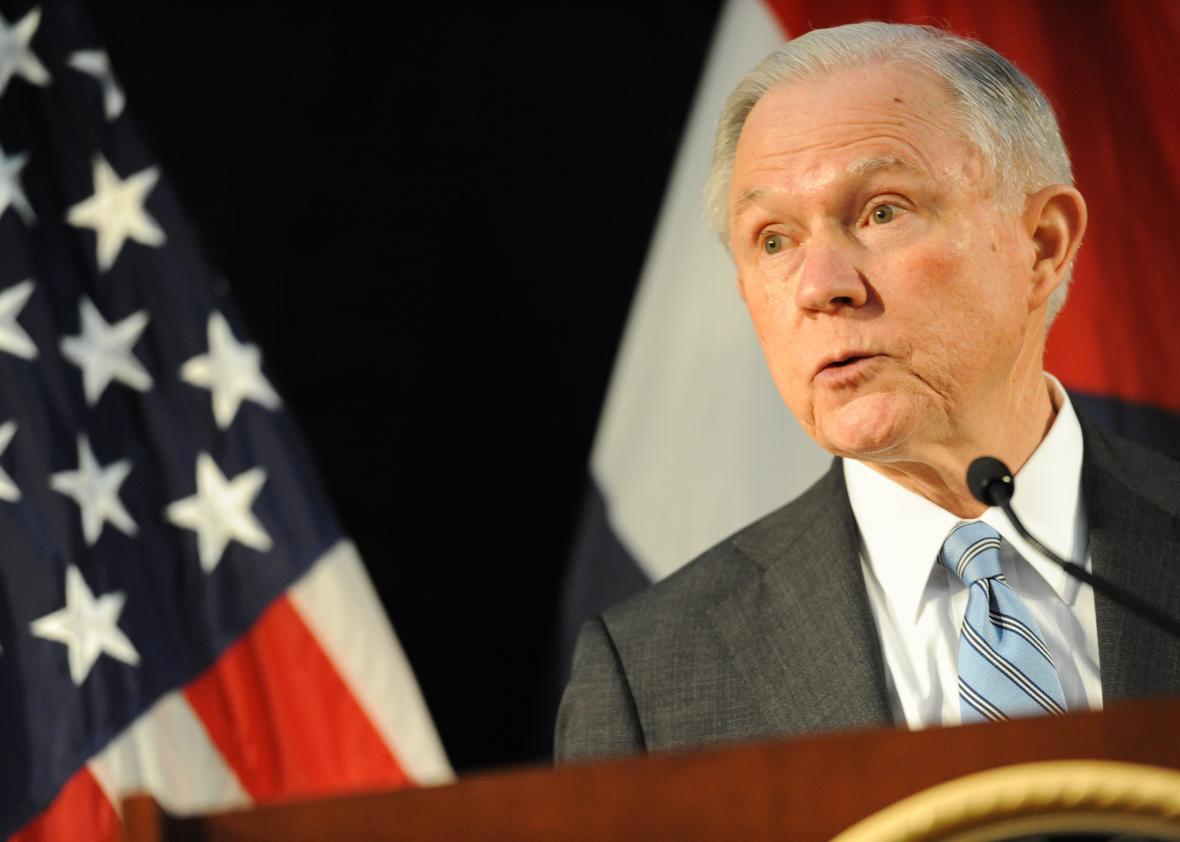
Photo by Michael B. Thomas/Getty Images
On Friday, the Justice Department announced yet another loud ultimatum against the nation’s so-called sanctuary cities, with a testy press release calling New York City “soft on crime,” and a round of letters directing officials in eight large cities and Cook County, Illinois, to demonstrate their compliance with federal immigration law. The action comes a month after Attorney General Jeff Sessions implied that those jurisdictions would soon be denied criminal justice grants and more, as President Trump has also promised.
And yet over the past two weeks, arguing against lawsuits over Trump’s executive order on sanctuary cities, Sessions’ own federal attorneys have been trying to downplay the administration’s threats in court.
Since President Trump signed an executive order to withhold federal funding from sanctuary cities in January, a handful of cities and counties have sued the administration. The cases vary slightly, but each alleges the order is an unconstitutional power grab and an act of retribution, and seek an injunction of the January 25 order.
As I wrote back then, the administration’s power to deny taxpayer funds to sanctuary cities—as the president had promised on the campaign trail—seemed to be quite limited. It appears that Trump’s lawyers agree. The latest “crackdown” merely consists of letters sent to cities asking them to certify their compliance with federal immigration law.
Trump made big promises on sanctuary cities, a blanket term for jurisdictions that don’t fully cooperate with federal immigration police. “We will end the sanctuary cities that have resulted in so many needless deaths,” the president said on the campaign trail in August. “Cities that refuse to cooperate with federal authorities will not receive taxpayer dollars.” In a press released announcing the letters, the DOJ called New York City “soft on crime,” though the murder rate is at a 50-year low.
But as cities’ cases against the Trump administration arrive in court, lawyers from the Department of Justice are downplaying the administration’s intent. At a hearing in the cases brought by the City of San Francisco and Santa Clara County, which have been combined, the cities alleged that Trump was threatened to deprive them each of $1 billion.
In fact, countered Acting Assistant Attorney General Chad Readler, the order would affect less than $1 million in DOJ and DHS grants to Santa Clara and possibly no money at all granted to San Francisco. NBC News reported from the courtroom:
Readler’s comments about the money appeared to catch U.S. District Judge William Orrick by surprise. Orrick then questioned the point of the president’s executive order. The administration was using a ‘bully pulpit’ to highlight an issue it cares deeply about, Readler responded.
Richmond, another Bay Area jurisdiction that has asked for an injunction of the Trump order, had its day in court earlier this week, and Trump’s lawyers reprised that argument. The gist? Cities are overreacting—only federal grants administered by DOJ and DHS are threatened, and “appropriate enforcement action,” which sounds like a menacing, expansive clause, simply meant civil litigation. (And, the lawyers add, we haven’t actually done anything yet.)
In some ways, the dispute recalls the Trump’s problem with his second travel ban: Just as lawyers were attempting to argue the second ban was substantively different than the first, Trump and co. were telling supporters and the press they were exactly the same. A similar contrast emerged in how the administration addressed the president’s baseless claims of widespread voter fraud in court.
The big difference, of course, is that while Trump’s travel order took effect immediately, the sanctuary city order has yet to concretely impact cities like San Francisco and Richmond, except in budget planning. (And if the DOJ lawyers are to be believed, the effect there could be at most minor.)
Still, it’s clear that the same pattern is emerging: Trump and Sessions are talking a big “crackdown” in Washington, but his lawyers are quietly arguing it’s no big deal. New York City, the largest jurisdiction addressed by Sessions’ letters, receives $9 million a year in DOJ grants. The city’s total budget is more than $80 billion.